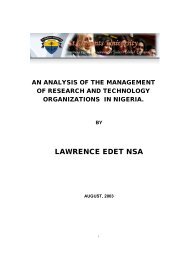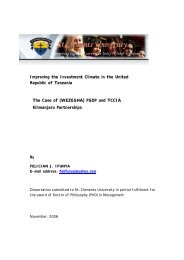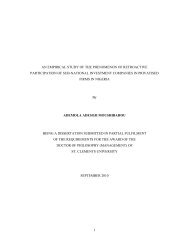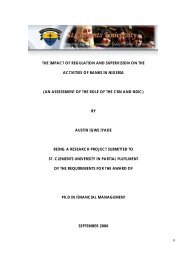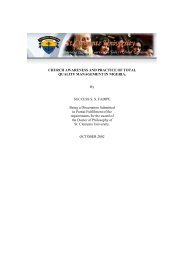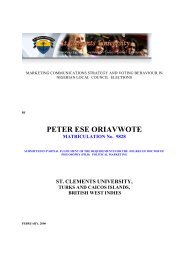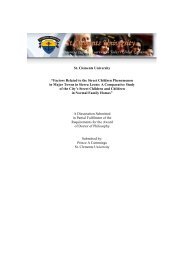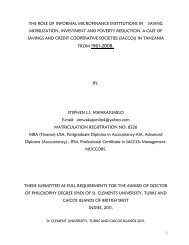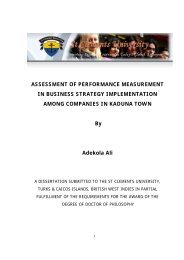Rufus Folorunso Akinyooye - St Clements University
Rufus Folorunso Akinyooye - St Clements University
Rufus Folorunso Akinyooye - St Clements University
Create successful ePaper yourself
Turn your PDF publications into a flip-book with our unique Google optimized e-Paper software.
virtue of the exercise. The loss of jobs by the erstwhile employees of the liquidated banks also<br />
has its cost implication for the country.<br />
The light at the end of the tunnel however is that a successful implementation of the Accord<br />
should produce a salutary effect on banking in Nigeria by reducing the rate of bank failures.<br />
Bank failure is an anathema in any economy, developed, developing or underdeveloped. No<br />
matter how small the bank is, its failure is usually felt in its immediate vicinity and even far<br />
beyond it. In order to develop, every economy needs a resilient banking industry.<br />
As the erstwhile Finance Minister Dr. Mrs. Ngozi Okonjo-Iweala (2004) rightly stated, “a stable<br />
and virile financial system is crucial to the growth and development of every economy”. This<br />
she said is because the financial system, particularly the banking sector performs the vital role<br />
of financial intermediation. The effectiveness and efficiency of these, she said would depend on<br />
the degree of safety, soundness and the stability of the banking system. She acknowledged the<br />
importance of the banking sector in economic development, that, she said is the more reason,<br />
governments the world over regulate it more than other sectors. In addition, she said, bank<br />
failures are widely viewed in all countries as more damaging to the economy than failures of<br />
other types of firms of similar size. She said their failure may produce losses to depositors and<br />
other creditors, break long-standing bank-customer relationships, disrupt payment system,<br />
and spill over in a domino fashion to other banks, financial institutions and markets, and even<br />
to the entire macro-economy.<br />
Even though the Nigerian Deposit Insurance Corporation (NDIC) in its role as a government<br />
owned insurer of bank deposits would naturally come in as liquidators to line up the banks<br />
assets against its deposit liabilities, the refund of deposits is usually too little and too late.<br />
Despite Presidential assurances, the famous soccer star Austin J. J. Okocha is yet to get back his<br />
US$1m. or so trapped in closed Savannah Bank Plc. the liquidation process of which is still<br />
pending in the courts. Most of the depositors of this bank have not been paid and no one<br />
knows when they would be. As a matter of fact Ogunleye (2004) stated that out of the 32<br />
insured banks closed in 1998 only 9 have gotten their depositors fully repaid the statutory<br />
limits of their insured deposits as at the end of January 2004. The banks are:<br />
(1) ABC Merchant Bank Ltd.<br />
(2) Alpha Merchant Bank Ltd.<br />
(3) Amicable Bank of Nigeria Ltd.<br />
(4) ICON Ltd. (Merchant Bankers).<br />
(5) Kapital Merchant Bank Ltd.<br />
(6) Nigeria Merchant Bank Ltd.<br />
(7) Pan African Bank Ltd.<br />
(8) Premier Commercial Bank Ltd.<br />
(9) Rims Merchant Bank Ltd.



